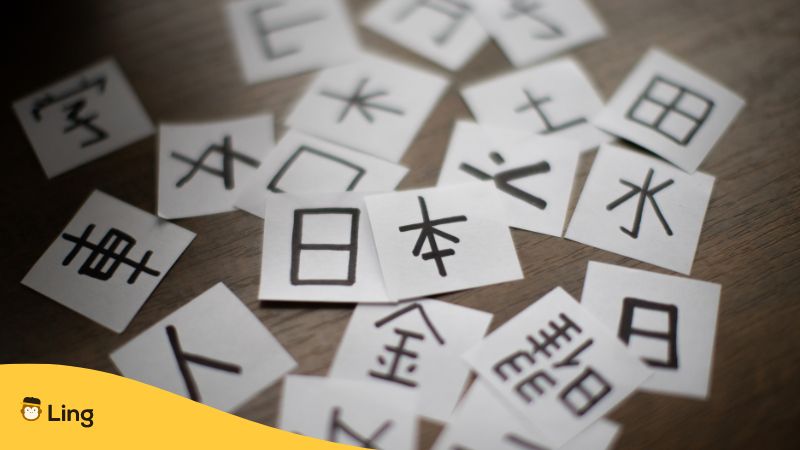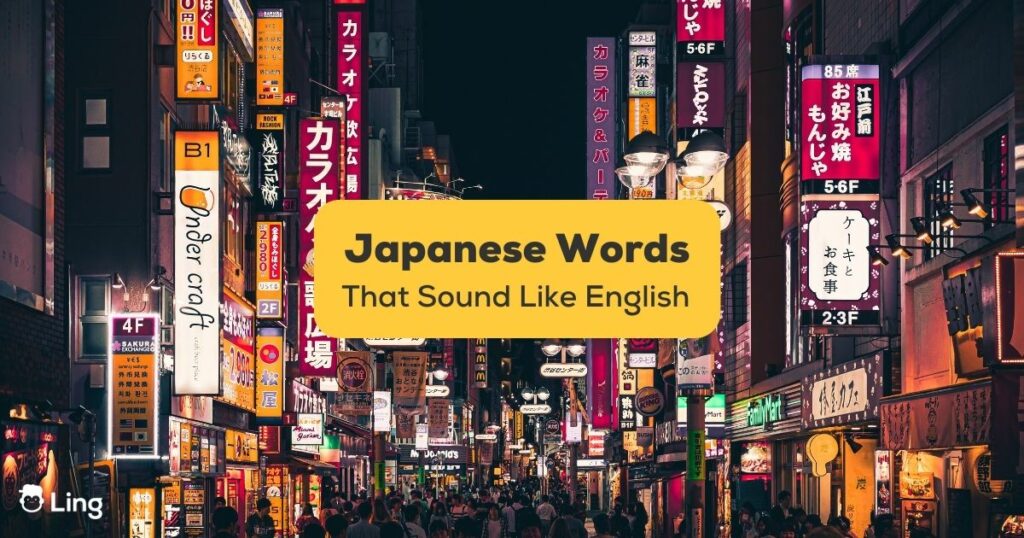Do you think Japanese is so difficult to learn and has nothing in common with English? Well, that’s a lie! I mean, yes, Japanese may be a little difficult to learn, as we discussed in one of our previous articles. But did you know that there are tones of Japanese words that sound like English?
How? That’s what this article is about! Let’s find out how “Japanglish” mixes up the Japanese language and English language.
Page Contents 📑
- Why Are So Many Japanese Words Similar To English?
- What Is Japanglish?
- Japanese Words That Sound Like English
- Famous Brand Names In Japanese
- Start Learning Japanese With Ling!

Why Are So Many Japanese Words Similar To English?
Some Japanese words have the same meaning as original English words, while others have an altered meaning. There are two main reasons why these Japanese words sound like English:
- They are either loanwords borrowed from English or,
- They are wasei-eigo words – “English words made in Japan.”
Now, let’s take a look at them one by one.
1. Loanwords
Loanwords (外来語, gairai-go) in Japanese didn’t only come from English. Indeed, the very first borrowed terms were from foreign languages such as Portuguese, French, German, and Dutch. It wasn’t until the end of World War II that the Japanese language started to borrow English words. And since then, Japanglish has continued to grow with the addition of new loanwords and has become more popular.
When it comes to speaking Japanglish, the young Japanese generation often uses loanwords in day-to-day conversations, but the old generation may not even know what they mean.
Loanwords are always written in the katakana writing system and pronounced and transcribed with Japanese pronunciation rules. Here is what you need to know about Japanese pronunciation rules:
📌 Consonants in Japanese end with one of these vowels: あ(a), い(i), う(u), え(e), お(o).
📌 There’s no distinction between L and R sounds in Japanese, that’s why “L” sounds in English are pronounced using “R” in Japanese.
And here are a few examples:
- Ice cream – アイスクリーム (aisu kurīmu)
- Beer – ビール (bīru)
- Taxi – タクシー (takushī)
You can learn more about Japanese pronunciation here!
Here’s the vocabulary list for common loanwords in Japanese. These loanwords have the same meaning as their English counterparts.
| English | Japanese | Pronunciation |
|---|---|---|
| Glass | グラス | gurasu |
| Fork | フォーク | fōku |
| Knife | ナイフ | naifu |
| Bus | バス | basu |
| Internet | インターネット | intānetto |
| Website | ウェブサイト | webusaito |
| Hotel | ホテル | hoteru |
| Restaurant | レストラン | resutoran |
| Elevator | エレベーター | erebētā |
| Size | サイズ | saizu |
2. Wasei-Eigo
Wasei-eigo, meaning “English made in Japan“, is a bit different than regular loanwords. They are still borrowed English words, but they don’t have the same meanings as their English counterparts.
For example, the Japanese word コンセント (consento) can remind you of the concepts like consent and permission. That’s not even close to its Japanese meaning! In Japanese, it actually means “electrical outlet.”
Here’s the vocabulary list for common wasei-eigo words in Japanese.
| English | Japanese | Pronunciaiton |
|---|---|---|
| Apartment (bigger) | マンション | manshon |
| Apartment (smaller) | アパート | apāto |
| Makeup | メイク | meiku |
| Entertainer | タレント | tarento |
| Cheating on an exam | カンニング | kanningu |
| Pancake | ホットケーキ | hotto kēki |
| Supermarket | スーパー | sūpā |
| Do your best! | ファイト! | faito! |
| Very excited | ハイテンション | hai tenshon |

What Is Japanglish?
As you may have realized, I’ve used the term “Japanglish” a few times in this article. If you have no idea what’s Japanglish or how it originated, this part is prepared specifically for you.
Japanglish is a so-called language mix of Japanese and English. By now, I bet you have one question in mind… Why Did Japanglish Emerge?
Well here’s my take on this: Japanglish wasn’t invented on purpose. It emerged naturally because of the differences between the Japanese and English languages.
All non-native English speakers speak with an accent coming from their native language, but they are not as dominant as the accent of Japanese people. Because they try to speak English with a limited syllabary and some missing sounds that English has, but Japanese doesn’t have (such as “L”, “V”, and “TH”) in the Japanese language.
- All Japanese words end with a vowel (except for the letter “n”). That’s why the word “bus” becomes “basu”.
- Japanese pronunciation is stable, and it doesn’t change, no matter what.
- There is no such sound as “si”; it’s “shi” in Japanese. That’s why the word “seem” becomes “sheemu”.
- There is no such sound as “fi”; it’s “hi”. That’s why the word “coffee” becomes “kohee”.
- There is no clear “R” or “L” sounds in Japanese.
I can make this list go forever, but let’s save them for another article. You can read this article published by CNN Travel to learn more about Japanglish.
So, due to all the reasons above and more, Japanese people can’t help but speak “Japanglish” rather than English.
Japanese Words That Sound Like English
We can divide Japanese loanwords into three categories based on the way they are formed.
Short Word Combinations
These Japanese loanwords are made from two or more English words combined and shortened into one word. They usually consist of four syllables. Here are some examples:
- Remote controller = リモコン (rimokon) – remote + controller
- Mass media = マスコミ (masukomi) – mass + communication
- Air conditioner = エアコン (eakon) – air + conditioner
- Image change = イメチェン (imechen) – image + change
Words That Combine English And Japanese
These words are formed by combining an English word and a Japanese word together. Here are some examples:
- Energy-saving = 省エネ (shōene) – 省 (save)+ energy
- Nostalgic song = 懐メロ (natsumero) – 懐 (nostalgic) + melody
- Italian food = イタ飯 (itameshi) – Italian + 飯 (meal)
- Sprint = 猛ダッシュ (mōdasshu) – 猛 (fierce) + dash
Loanwords Turned Into Japanese Verbs
These words turn into a Japanese verb by adding the Japanese verb する (suru) – meaning “to do” -after a loanword. Here are some examples:
- To knock = ノックする (nokku suru) – knock + suru
- To jog = ジョギングする (jogingu suru) – jogging + suru
- To put on makeup = メイクする (meiku suru) – make + suru
- To party = パーティーをする (pātī o suru) – party + o + suru
Famous Brand Names In Japanese
If you don’t know how Japanese people say famous brand names, you can’t understand what brand they are talking about since the pronunciation is pretty different. Here are a few examples:
- Google – グーグル (Gūguru)
- Apple – アップル (Appuru)
- Starbucks – スターバックス (Sutābakkusu)
- Kentucky Fried Chicken – ケンタッキー フライド チキン (Kentakkī furaido chikin)
- McDonald’s – マクドナルド (Makudonarudo)
Let’s end this article with a fun song that perfectly describes what we’ve discussed so far:
Start Learning Japanese With Ling!
If you want to learn the real Japanese language – not Japanglish – Ling is here to help you!
Ling teaches you hundreds of Japanese vocabulary that can be used in everyday life in Japan. You can learn Japanese from scratch by practicing Japanese characters first and gradually leveling up to speak confidently with the natives. So what are you waiting for? Grab your iOS or Android device now and head to Google Play Store or Apple App Store to download Ling right now and try it for free!
Plus, don’t forget to visit our Japanese blog weekly to learn more about Japanese language and culture!
じゃあまたね!



































































